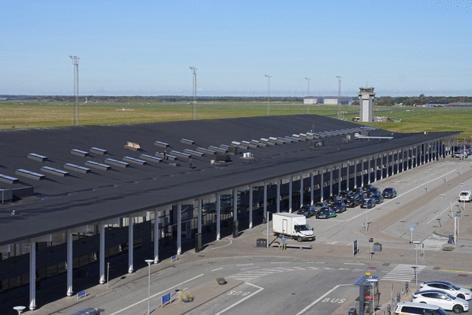Denmark warns Russian sabotage likely amid drone suspicions
Published in News & Features
Denmark’s Prime Minister Mette Frederiksen warned Danes to brace for more hybrid attacks, pointing to Russia as Europe’s top security threat as suspected drone sightings occurred for the third time in a week.
Authorities still cannot conclude who is behind several drone incidents across Danish airports in recent days, but Russia remains Europe’s main adversary, seeking to destabilize the continent, Frederiksen said in a video speech on late Thursday.
“These are attacks we must expect more of. These are attacks that have exposed vulnerabilities,” she said, adding that Danes should also prepare for more sabotage, cyberattacks and the destruction of subsea cables.
The warning came just hours before authorities closed the airspace over Aalborg airport and military air base over suspicion of illegal drone activity. Two flights were canceled, broadcaster DR reported. The airspace was closed for about an hour, reopening just after midnight on Friday. No drone sighting was confirmed, demonstrating how on edge authorities are.
In addition to the drone sightings in Denmark, Poland, Estonia and Romania have suffered a series of airspace violations this month, prompting European warnings to the Kremlin that they’re ready to respond with full force, including potentially shooting down planes.
Russia has denied involvement in the Danish drone incidents and that its aircraft crossed into Estonian airspace. It has also said that a separate incident when drones entered Polish territory was an error.
German Foreign Minister Johann Wadephul called the incidents an attempt by Russian President Vladimir Putin to test NATO’s defenses.
“Our countries do not have any interest in escalation, but Russia perhaps wants to lead us into a trap,” Wadephul said Friday in an interview with Bloomberg TV in New York.
The incidents come ahead of a high-level meeting of European leaders in Copenhagen next week to discuss security and defense, including how to deal with recent hybrid attacks and Russian airspace incursions. Danish authorities have raised the alert level and are preparing for different scenarios, Frederiksen said. It means the military and police will be more visible with anti-drone capacity around critical infrastructure.
Police is also reviewing its plans for the summit and considering potential changes needed to ensure security during the event, Peter Ekebjaerg, police spokesperson, said in a briefing on Friday afternoon. Meanwhile, Sweden has offered to assist Denmark with its military anti-drone capabilities “to increase security during the meeting,” Swedish Prime Minister Ulf Kristersson said in a post on X.
Reports of illegal drone activity also led authorities to briefly close the airspace over Billund airport on Friday morning, though no flights were affected, TV2 reported, citing police. It later turned out to be a bright star in the sky. Police has received more than 500 drone reports nationwide in the past 24 hours, but it has ruled out illegal activity for the most part, Ekebjaerg said.
Defense Minister Troels Lund Poulsen attended a virtual meeting on Friday with the European Union’s Defense Commissioner Andrius Kubilius and some other E.U. countries about the creation of a “drone wall” to protect the bloc’s eastern flank. They agreed to start work on conceptional and technical roadmap for the drone wall, which will include advanced detection, tracking and interception capabilities, Kubilius said in a briefing in Helsinki.
Separately, the Danish government on Friday announced a 2.7 billion-krone ($423 million) donation to Ukraine, most of which will be directed to the Ukrainian defense industry. Poulsen told reporters in Copenhagen that Denmark needs to look at adopting some of the technologies developed in Ukraine to protect Danish critical infrastructure.
Speaking at the same briefing, Foreign Minister Lars Lokke Rasmussen said Denmark has no plans to invoke the North Atlantic Treaty Organization’s Article 4, which triggers consultations and can open a path to coordinated action among allies, as previously considered by his government in response to the drones.
Denmark is one of Ukraine’s strongest supporters, having donated large quantities of military equipment and financial support, and allowing Ukrainian defense companies to set up operations on its soil. Earlier this month, the government also announced it would buy long-range missile systems capable of striking targets in Russia. Some analysts suggest those moves may have triggered Russian response.
“If it is Russia, it would fit a pattern where some of the countries most active in criticizing Russia and supporting Ukraine are subjected to hybrid threats,” said Sten Rynning, professor of war studies at University of Southern Denmark. Authorities are still investigating who were behind the Danish incidents, but said they were likely carried out by a professional agent, possibly a state actor.
The risk of Russian espionage and sabotage in Denmark is “high,” Finn Borch, director of the Danish Security and Intelligence Service, said at a news conference on Thursday evening, adding that the events resemble hybrid warfare seen elsewhere in Europe. Denmark’s investigation into the episodes includes studying the movement of ships.
The government has come under intense criticism for allowing unauthorized drones to fly undisturbed over Denmark’s most critical infrastructure for hours, facing questions over why authorities failed to detect them earlier and why no measures were taken to intercept or bring them down.
The premier said she’d been in close contact with several European leaders in recent days, including counterparts in Germany, the U.K., and the Nordic countries and NATO about how they can support Denmark.
----------
—With assistance from Julia Janicki and Christopher Jungstedt.
©2025 Bloomberg L.P. Visit bloomberg.com. Distributed by Tribune Content Agency, LLC.







Comments